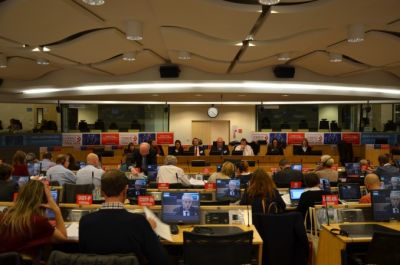
ETUC resolution on the Future of Social Dialogue
Adopted by the Executive Committee on 14-15 December 2016
The European Social Dialogue
Social dialogue at all levels is part and parcel of the European social model. It is enshrined in the TFEU, namely article 152-155, and part of the European acquis communautaire. But sound industrial relations also have an economic added value. It is recognised – including by employers – that countries with the most developed social partnerships and effective social systems are among the most successful and competitive in the world, even in times of crisis. Strong industrial relations, including collective bargaining, are part of democracy and necessary instruments for a fair and efficient regulation of the economy and of the labour market.
Other levels and dimensions that play an important role in the development of social dialogue are tripartite dialogue, European Works Councils, European and international framework agreements, IRTUCs, etc.
The Challenges for Social Dialogue
The crisis that struck Europe in 2008 has had a negative impact on social dialogue and collective bargaining at all levels. Bi- and sometimes tri-partite social dialogues have in several countries been decentralised, dismantled or undermined, directly or indirectly, as a result of European and national policies, often initiated by the Troika (European Commission, European Central Bank and International Monetary Fund) or the Country-specific Recommendations in the framework of the EU Semester.
The Commission, which was a proactive player 20 years ago with real social initiatives and policies, is no longer supporting the social dialogue ‘in a balanced way’, as it should, but is instead pushing for deregulation (so-called ‘better regulation’ or REFIT) at all levels.
The ETUC is currently facing opposition from employers and certain governments to any binding instrument arising from an autonomous, inter-professional or sectoral agreement, as a matter of principle. In the absence of (legislative) pressure from the Commission, they are even less keen to negotiate.
Furthermore, in several Member States and candidate countries, the political context is not supporting the development of European legislation, nor the national social dialogue. In other cases, employers do not engage effectively in industrial relations with unions, but instead lobby governments in order to secure policies that weaken minimum social rights and standards.
Key Actions and Priorities
In its Congress Action plan 2015-2019 the ETUC committed to developing a strategy and coordinated actions to secure progress in the social dialogue at inter-professional and sectoral levels throughout the public and private sectors, in order to define binding and eligible instruments. Following discussions on the future of social dialogue in the Social Dialogue Committee and during an ETUC workshop in Bratislava in December 2016, the ETUC proposes the following key actions and priorities:
Rapid identification of relevant social dialogue issues and prioritisation of actions. Making timely and clear decision whether to make efforts to engage in a Social Dialogue or going to try to achieve political aims by lobbying Commission/Parliament/National Governments.
Efficient treatment of themes agreed with employers’ associations through - A) negotiation of agreements, or B) working in groups/committees and dealing with joint declarations/statements. Avoiding time wasting on issues of minor politically importance is crucial.
The ETUC will hold an annual social dialogue workshop, facilitating a discussion with national confederations and European Trade Union Federations on recent developments, a stock taking of the implementation of agreements, the follow up of framework of actions and the updating of the social dialogue agenda. This workshop would also support the identification of possible joint actions, together with the ETUFs, towards the European institutions.
The possibility of setting up a joint working group on the modernisation of social dialogue together with the European employers’ organisations will be explored. This working group would investigate, among other things, how to improve the effectiveness of the Social Dialogue Committee.
The ETUC will launch an internal discussion on the next Work Programme 2018-2020 of the European Social Partners in early 2017. Input will be sought on the character as well as content of the next work programme. The ETUC is committed to achieving a short, concrete and precise work programme, while maintaining the flexibility to jointly address issues which may not be addressed directly in the text of the work programme. Issues which have been provisionally identified are digitalisation, skills and qualifications, working time, and restructuring.
A conference with sectoral employers’ associations to discuss overarching social policy issues and opportunities on to work together on a cross-industry basis.
Implementation of European Social Dialogue Outcomes
The subgroup of the Social Dialogue Committee is mandated to examine the implementation of the autonomous agreements of the European social partners where there has been a perceived lack of implementation. The work of this subgroup needs to continue and be advanced.
The ETUC will seek how to involve European Works Councils actively in the implementation of its autonomous agreements. The first step is to promote the agreements during EWCs meetings.
Developing a stronger link between social dialogue and collective bargaining is a priority, and therefore the ETUC will engage with the national confederations and the European Trade Union Federations to identify how to ensure this link.
Capacity Building
The European Social Fund should be better utilised to support social dialogue and capacity building at national level. The involvement of the social partners in the governance of the ESF, as well the use of the ESF to support social dialogue at national level will be examined during the Integrated Project of the European Social Dialogue 2016-2018.
The ETUC will promote cooperation in regional cluster groups through organising on demand national seminars and twinning seminars.
The ETUC will continue to organise its ESDA (European Social Dialogue Academy) to train young trade unionists on European social dialogue.
In addition to these actions and priorities, the ETUC will intensify its efforts to ensure the European Commission follows through on its commitments in the Quadripartite statement on A New Start for Social Dialogue[1], namely to take a pro-active role in promoting and supporting social dialogue.
[1] http://ec.europa.eu/social/BlobServlet?docId=15738&langId=en
